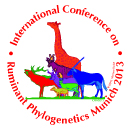International Conference on Ruminant Phylogenetics Munich 2013
06.11.2013
International Conference on Ruminant Phylogenetics
Ruminants (antelopes, deer, and relatives) are the most abundant (over 3 billion individuals) and diverse (up to over 300 distinguished species) group of ungulates. They include most of the agriculturally, environmentally, economically and culturally important species on earth. They display a fascinating spectrum of adaptations allowing them to successfully inhabit nearly every terrestrial biome. Yet, the evolutionary history of ruminants remains enigmatic in many aspects. The fossil record documents 43 million years of diversification including several key radiations, marking important steps in ruminant cladogenesis. This long time of originations and extinctions makes ruminants an ideal group in which to study components of evolutionary theory, like selection and speciation.
Ruminant phylogenetics has been a subject of scientific interest since the initial Linnean classification in 1735. Many competing phylogenetic hypotheses have been advanced since then, linking the many extinct and the six surviving ruminant families in almost every possible manner. For 250 years, these hypotheses were based on comparative studies of diverse phenomic traits in a wide array of disciplines. In the last 20 years, advances in genome sequencing, developmental genetics, and computational phylogenetics have brought new forms of data and methodologies to bear on these questions. In some cases, this has helped to resolve phylogeny. In others, it has added to the confusion. Both phenomic and genomic data from fossil and extant species accumulate at an ever increasing rate. Expertise from specialists in all of these diverse disciplines is needed to make a coherent and logical synthesis of this enormous amount of data.

From September 3rd through 6th 2013 the GeoBio-CenterLMU hosted the first International Conference on Ruminant Phylogenetics with more than 60 participants from all over the world as an initial event of a ruminant phylogenetics initiative. This included researchers from many different disciplines (palaeontology, neontology, molecular biology, physiology, ethology, conservation biology) and all career stages. It has been the first of its kind and aimed at providing an interdisciplinary meeting environment, promoting interaction of leading experts in diverse aspects of comparative ruminant (palaeo)biology. It was designed to produce a stimulating atmosphere for intensive debate on crucial issues leading to the recognition of critical deficiencies and the initiation of collaborative efforts to resolve them. Working groups (skeletodental anatomy, non-hard tissue phenotypy, molecular biology) have been established and the integrative approach of all disciplines involved is determined a major aspect in all research efforts planned.
Dr. Alan W. Gentry, a recognized expert on fossil ruminants and former scientist of the Natural History Museum London, has been honoured for his long commitment and important contribution to ruminant systematics and phylogeny during the conference.
The German Science Foundation (Deutsche Forschungsgemeinschaft) has been the main sponsor of the conference. Besides Bayerische Staatssammlung für Paläontologie und Geologie and Metabion international AG (association for applied biotechnology) provided further financial support. The Munich zoo Tierpark Hellabrunn, beverage company Viqua GmbH, and Geobiologie & Paläontologie LMU provided support of other kind.
Conference organisers were PD Dr. Gertrud Rössner (Bavarian State Collections of Palaeontology and Geology), Prof. William Silvia (Animal and Food Sciences, University of Kentucky), Dr. Grégoire Métais (CNRS researcher, Musée National d’Histore Naturelle Paris, Palaeontology), Prof. Brian Beatty (New York Institute of Technology, College of Osteopathic Medicine, Anatomy), Dr. Eva Bärmann (Museum für Naturkunde Berlin, Leibniz-Institut für Evolutions- und Biodiversitätsforschung, Zoology), Prof. Gert Wörheide (Department für Geo- und Umweltwissenschaften, Ludwig Maximilians-Universität München).
Conference programme, abstracts, list of participants and authors can be viewed here.
Arrangements to publish a conference proceedings-volume in fall 2014 have been made.
You are interested in up-coming information on future activities or collaboration? Please contact Gertrud Rössner.





